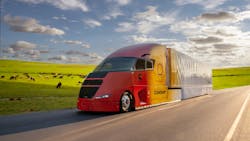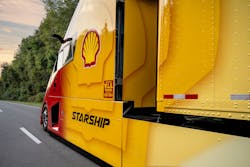Shell Starship 3.0 completes West Coast journey
Shell's third iteration of the Starship truck, powered by a Cummins X15N natural gas engine and renewable natural gas (RNG), finished its 840-mile journey through California. In a press release, the company stated that the truck improved upon the U.S. average for diesel Class 8 trucks with a freight ton efficiency (FTE) that was 2.542 times better than its diesel peers, and 3.23 times better based on ton-miles per kg of CO2e emitted. As with Shell's first two Starships, this metric was assessed on a ton-miles per gallon basis and verified by the North American Council of Freight Efficiency (NACFE).
"Shell Starship 3.0 demonstrates the power of innovation by incorporating a new natural gas engine complimented by today's available technologies to help reduce emissions in the road transport industry," said Dr. Selda Gunsel, president of Shell Global Solutions and VP of fuels and lubricants technology. "Industry collaboration is critical in helping fleets achieve their sustainability goals."
See also: First look at Shell Starship 3.0While Shell has yet to release exact numbers on the Starship 3.0's freight ton efficiency and its average mpg during its trek, it's already promising that it performed .06 times better than the 2.0 Starship in 2021, which was 2.48 times better than the North American average.
To prepare for its journey, the 3.0 Starship focused on new components and features that promoted lightweighting, reduced aerodynamic drag, and low rolling resistance tires, even though the truck and its load were the heaviest of the three Shell Starships with a gross vehicle weight of 80,000 lbs. Besides the new engine, which offered up to 500 horsepower output and required a custom fan spacer, these updates also included fitting the Starship 3.0 with the largest-possible CNG tanks and using low-viscosity Shell Rotella natural gas engine oil and Shell Spirax transmission and axle oils.
"Each Starship generation shows our current and future customers that we are leading the effort to empower fleets with real-world data that will help guide their decisions to help reduce emissions," Tom Mueller, GM of Shell commercial road transport lubricants, said. "Shell Starship is a proving ground of how working together across the industry can lead the way to more sustainable solutions."
Since its start in 2018, the Starship initiative has showcased that innovation and collaboration through the development of new technologies and fuels can help reduce emissions in the transportation sector. This truck version included partnerships with Cummins for the driveline technology, Bridgestone for tires, and Trillium (part of Love's family of companies) for renewable natural gas.


